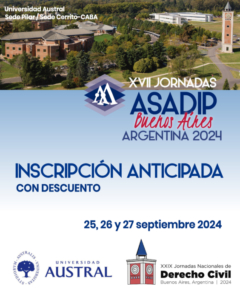
ASADIP: A Extra Clever and Much less Synthetic Non-public Worldwide Legislation
By Juan Ignacio Stampalija
The XVII Convention of the American Affiliation of Non-public Worldwide Legislation (ASADIP) was held on September 25-27. Beneath the title ‘A Extra Clever and Much less Synthetic Non-public Worldwide Legislation,’ the principle regional specialists, in addition to worldwide friends, met at Universidad Austral of Argentina to debate the principle challenges of present non-public worldwide legislation.
On the primary day, the Convention was opened by C. Ignacio de Casas, Secretary of Tutorial Affairs of the Universidad Austral College of Legislation and Paula María All, outgoing President of ASADIP. Moreno Rodríguez (Paraguay) gave the inaugural lecture entitled ‘Non-public Worldwide Legislation and Funding Arbitration.’
The primary day of the Convention additionally included three panels. The primary centered on the ‘Challenges of Worldwide Authorized Cooperation within the Digital Period.’ It was moderated by María Blanca Noodt Taquela (Argentina) and Gonzalo Lorenzo Idiarte (Uruguay), with María Laura Capalbo (Uruguay), Juan José Cerdeira (Argentina), Marcos Dotta (Uruguay), Alejandro Menicocci (Argentina), Roberto Ruiz Diaz Labrano (Paraguay), and Valesca Raizer Borger Monschen (Brazil) as panellists. The second panel mentioned ‘Contracts and Digital Property,’ with Verónica Ruiz Abou-Nigm (Uruguay) as moderator and the participation of Jorge Oviedo Albán (Colombia), Gérardine Goh Escolar (The Hague, HCCH), Ana Mercedes López Rodríguez (Spain), Anna Veneziano (Italy, UNIDROIT, on-line) and Luca Castellani (Austria, UNCITRAL, on-line). The third panel, as is customary in all ASADIP conferences, was the Assembly of Worldwide Boards on Non-public Worldwide Legislation (MIFPIL). Paula María All (Argentina) acted as moderator and Florencia Castro (Argentina, HCCH), Anna-Joubin Bret (Vienna, UNCITRAL, video recording), Cecilia Fresnedo de Aguirre (Uruguay, CJI, OAS), Dante Negro (USA, OAS) and Anna Veneziano (Italy, UNIDROIT, on-line) had been panellists.
The day ended with a lecture given by Andrés Rodríguez Benot (Spain) entitled ‘Get together Autonomy in Family Economics: The European Expertise on the Property Regime of Married {Couples} and Registered Partnerships.’
On the second day, the ASADIP Convention held joint actions with the Jornadas Nacionales de Derecho Civil from Argentina, with the participation of ASADIP members in Committee No. 9 on Non-public Worldwide Legislation. Beneath the theme ‘The New Frontiers of Get together Autonomy,’ a number of papers had been introduced regarding get together autonomy in several issues, corresponding to non-parity contracts, client contracts, new applied sciences, household legislation, and dispute decision, amongst others. Primarily based on these papers, fifteen conclusions on this concern had been drafted and unanimously handed, which might be learn right here (in Spanish).
To conclude the second day of the Convention, a panel entitled ‘Non-public Worldwide Household Legislation: Views from Comparative Legislation’ was held. The panel was moderated by Carolina Harrington (Argentina) and Fabio Mastrángelo (Argentina), with displays by María Mercedes Albornoz (Mexico), Andrés Rodríguez Benot (Spain), Nieve Rubaja (Argentina), María Laura Capalbo (Uruguay), Daniela Vargas Trejo (Brazil), and Elizabeth Villalta (El Salvador).
On the final day of the Convention, a joint HCCH-ASADIP assembly was held on ‘Non-public Worldwide Legislation and Tokens,’ with the participation of Gérardine Goh Escolar (The Hague, HCCH), Paula María All (Argentina), Fabricio Pasquot Polido (Brazil), Sebastián Paredes (Argentina), Juan Ignacio Stampalija (Argentina), and María Marta Herrera (Argentina). This was adopted by the presentation of a ebook entitled ‘Affect and Utility of the CIDIPs-OAS Conventions in Latin American Authorized Methods’ (obtainable right here, in Spanish). The ebook was introduced by Paula María All (Argentina), Dante Negro (USA, OAS), Eduardo Véscovi (Uruguay), Carolina Iud (Argentina), Daniela Trejo Vargas (Brazil), and Felicita Argaña Blendin (Paraguay). Lastly, the closing speech of the ASADIP Convention was given by Didier Opertti Badán (Uruguay), Honorary President of ASADIP, who was launched by Diego P. Fernández Arroyo (France).
Within the context of the Convention, the ASADIP Meeting was held, during which the brand new authorities for the interval 2024-2027 had been elected. Verónica Ruiz Abou-Nigm, from Uruguay, Chair of Non-public Worldwide Legislation on the College of Edinburgh, was elected President of ASADIP. Marcos Dotta Salgueiro (Uruguay) Vice-President for Worldwide Relations; Jorge Oviedo Albán (Colombia) Vice-President for Tutorial Affairs; Juan Ignacio Stampalija (Argentina) Vice-President for Communications and Publications, and Felicita Argaña (Paraguay) Vice-President for Finance.
Likewise, Tatiana Cardoso Squeff (Brazil) is Deputy Vice-President for Worldwide Relations; María Alejandra Ruiz Gómez (Venezuela), Deputy Tutorial Vice-President; Daniel Rojas Tamayo (Colombia), Deputy Vice-President for Communications and Publications, whereas Candela Villegas (Argentina) is Deputy Vice-President for Finance.
Furthermore, María Mercedes Albornoz (Mexico) was elected as ASADIP Secretary Common and Inez Lopes (Brazil) as Deputy Secretary Common.
As well as, ten members had been appointed to the governing board: Bruno Rivero (Uruguay), Carlos Odriozola (Mexico), Claudia Lugo (Venezuela), Edgar Riffler (Paraguay), Fernando Meinero (Brazil), Jaime Gallegos Zúñiga (Chile), Jaime Vintimilla (Ecuador), Margie-Lys Jaime (Panama), Paloma Hernández (Argentina), and Taydit Peña Lorenzo (Cuba).
Lastly, it needs to be recalled that Didier Opertti Badán (Uruguay) continues as Honorary President, whereas José Antonio Moreno Rodríguez (Paraguay) continues as President of the Advisory Council and Carolina Silvero (Paraguay) retains the position of Administrative Secretary of ASADIP.














![One-Week Faculty Development Programme (FDP) on Literature as a Repository of Indian Knowledge Systems by NLU Tripura [Online; Aug 25-30; 7 Pm-8:30 Pm]: Register by Aug 24](https://i2.wp.com/cdn.lawctopus.com/wp-content/uploads/2025/08/Faculty-Development-Programme-FDP-on-Literature-as-a-Repository-of-Indian-Knowledge-Systems-by-NLU-Tripura.png?w=120&resize=120,86&ssl=1)








